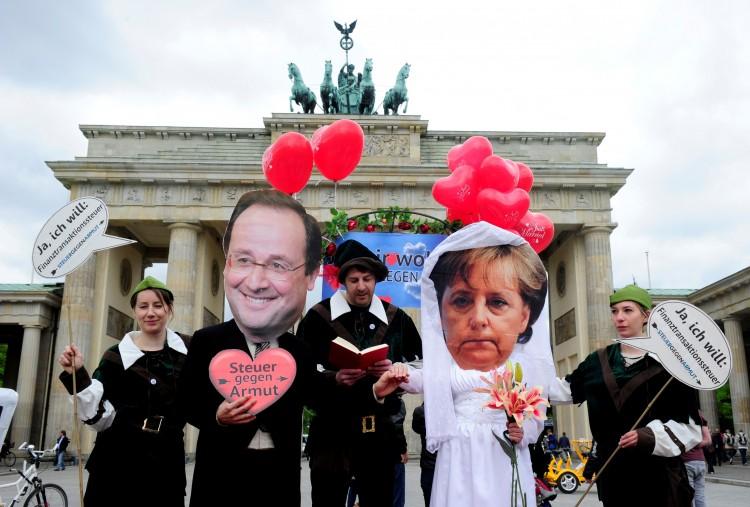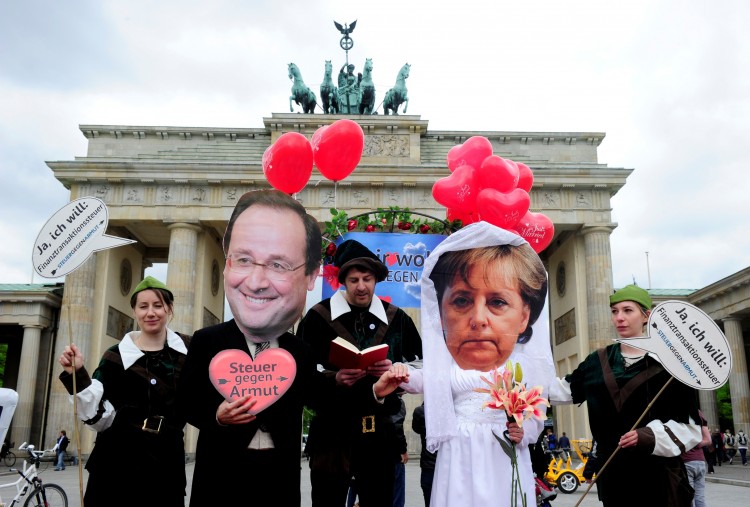Now that French voters have elected Socialist François Hollande as their new president, euro observers are watching for signs of the change of course in European economic policy that Hollande campaigned on. How that unfolds is likely to hinge on the relationship he forges with German Chancellor Angela Merkel, who was so cozy with outgoing French president Nicholas Sarkozy, that the duo was dubbed “Merkozy.”
Their partnership was instrumental in bringing about measures to preserve the euro amid the biggest crisis the EU has ever faced. Most recently, Merkozy convinced every member state (except the United Kingdom) to sign a fiscal pact mandating debt reduction and fiscal oversight.
Riding the wave of anti-Sarkozyism, Hollande declared repeatedly that as president, he would renegotiate the fiscal pact in order to include measures for promoting growth and job creation.
While Merkel openly supported Sarkozy during the presidential election— both hail from conservative parties—she had no choice but to accept the reality of Sarkozy’s defeat. At a press conference on Monday, Merkel said she would “welcome [Hollande] with open arms” when he visits Germany on his first foreign trip although she remains strongly opposed to any changes to the hard-won European agreements.
Martin Reuber, from the Konrad-Adenauer-Stiftung, a German-based political foundation, thinks that the pair may find a way to get along “since both Hollande and Merkel are aware that overcoming the crisis and strengthening of Europe depends on the unity of both of them,” he commented via email.
Because of this need to strengthen Europe, Reuber feels “there will be no fundamental change of direction in European politics.”
Reuber and other commentators point out that the only other French Socialist president in the last 50 years, François Mitterrand, enjoyed a good relationship with his German counterpart, Helmut Kohl. Despite being from opposing political camps, their genuine friendships contributed to an acceleration of European integration.
Moreover, there are risks for Hollande if he makes good on his campaign promises and questions existing treaties. He would “totally isolate himself” within Europe, says professor Joachim Scheide, head of the Forecasting Center at the Kiel Institute.
Scheide doubts Hollande will take this risk and thus sees “hope for compromise” with Germany.
Reuber says, in fact, there is a growing consensus among European politicians and economists that growth-oriented measures are needed to complement the debt-reduction policies in the eurozone.
The problem is, “differences between the political camps exist over the question of how competitiveness is to be achieved,” Reuber wrote.
The Merkel administration opposes weakening the course of austerity by using public money to finance stimuli to promote growth. Hollande, on the other hand, along with the German opposition and other socialist parties in Europe, are in favor of it.
Professor Stefan Homburg, who teaches public finance at the University of Hanover, is skeptical that Hollande can pull off cooperating with Germany and expects that a President Hollande will contribute to a serious destabilization of the eurozone.
“He will either continuously quarrel with stable countries like Germany, or he gives in and causes resentment in France, like we’ve seen in Greece,” Homburg wrote via email.
The Epoch Times publishes in 35 countries and in 19 languages. Subscribe to our e-newsletter.






